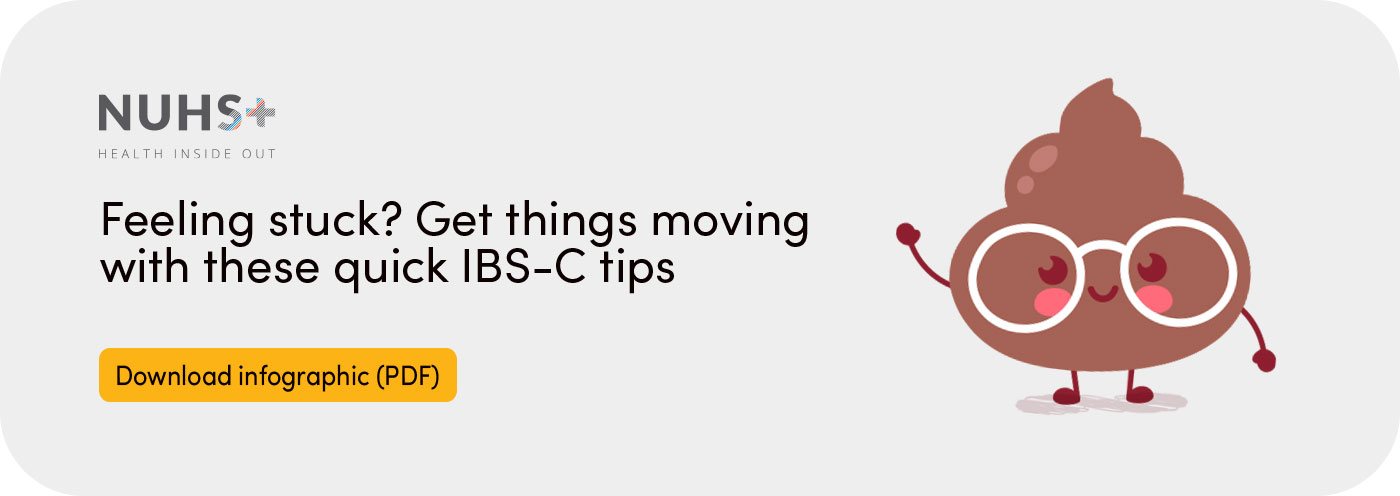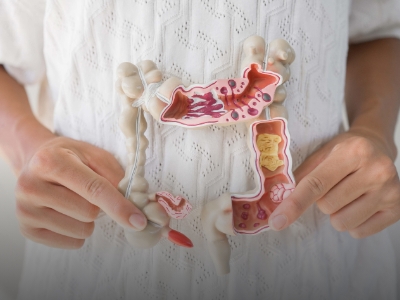Published on 1 April 2025
Often overlooked, irritable bowel syndrome with constipation is a chronic condition that disrupts daily life. But with growing awareness and evolving treatments, relief is within reach.
Constipation is often dismissed as a minor inconvenience – an issue easily resolved with a glass of water or a fibre-rich snack. But there is a sub-type of constipation that not only causes severe pain and discomfort but can persist for months on end: Irritable bowel syndrome with constipation (IBS-C).
For those living with IBS-C, the condition can lead to a persistent cycle of discomfort, bloating and the distressing sense of never feeling fully relieved. IBS affects about one in 10 people globally, with IBS-C being one of the most common subtypes.
“Occasional constipation can happen to anyone. It’s temporary and often due to dehydration, lack of fibre or even stress,” said Adj A/ Prof Kewin Siah, Senior Consultant, Division of Gastroenterology and Hepatology, National University Hospital (NUH). “But IBS-C is different. It’s a chronic condition that can persist for months or even years, with symptoms that include bloating, abdominal pain, straining, hard stools, infrequent bowel movements and the feeling that you never fully empty your bowels.”
At the root of IBS-C is a disconnect in the gut-brain axis – the intricate communication network linking the digestive system to the brain. “When this communication is disrupted, it affects not just stool frequency, but bowel function as a whole,” explained Adj A/Prof Siah. “IBS-C arises from a mix of factors, including gut motility issues, gut bacteria imbalances and a miscommunication between the brain and the gut.”
Stress can also be a major trigger for IBS-C. “Stress can slow digestion and increase pain sensitivity, making symptoms feel more severe,” he added. “That’s why stress management is important, whether through mindfulness, cognitive behavioural therapy, gut-directed hypnotherapy or low-impact exercises like walking or yoga.”
Flushing out the myths
Myth 1: IBS-C is just occasional constipation.
Fact: It is a chronic condition with abdominal pain, bloating and unpredictable bowel movements.
Myth 2: All probiotics help with IBS-C.
Fact: Some strains may help rebalance gut bacteria and ease symptoms, but results vary. Check with your doctor before starting any supplement.
Myth 3: Laxatives are the only solution.
Fact: They help, but long-term management also involves dietary adjustments, stress reduction, medication and gut-directed therapy.
Myth 4: Drinking more water will resolve constipation.
Fact: Hydration matters, but IBS-C is not caused by dehydration alone. Gut motility and brain-gut signalling play a bigger role.
One of the biggest challenges of IBS-C is that there is no one-size-fits-all treatment. While medications can help, most patients require a combination of dietary modifications, stress management and gut-directed therapies to manage their symptoms effectively.
Probiotics are increasingly being explored for their role in IBS-C. “These are an area of growing interest,” added Adj A/Prof Siah. “Some strains of Bifidobacterium – a type of beneficial bacteria that lives naturally in the gut and aids digestion – may help, but their effectiveness varies from person to person.”
Imbalances in gut bacteria may worsen IBS-C symptoms, and certain probiotics can help restore that balance. But not all strains work the same way, so it is best to speak to a doctor before starting any supplement.
Another treatment option, often viewed with scepticism, is laxatives. Yet these are widely misunderstood, explained Adj A/Prof Siah. “There’s a myth that laxatives cause dependency or permanent nerve damage to the colon,” he said. “But there is no evidence to support this. When used correctly, they are effective.”
Furthermore, not all laxatives are the same. Osmotic laxatives, such as lactulose or polyethylene glycol, draw water into the bowel to soften stool, while stimulant laxatives, such as senna or bisacodyl, stimulate bowel muscle contractions. These work differently and have different safety profiles. Patients should work with their doctors to develop a proper management plan.
Unlike ordinary constipation, IBS-C cannot be fixed simply by taking more fibre. In fact, some types of fibre can worsen symptoms. “Soluble fibre – such as psyllium, flaxseeds and oats – is generally better tolerated,” said Adj A/Prof Siah. “In contrast, insoluble fibre, which is found in wheat bran and raw vegetables, can worsen bloating and discomfort when consumed in excess.”
A movement in the right direction
Thankfully, new treatment options for IBS-C are emerging, offering hope to those who have struggled for years without relief.
Medications such as linaclotide and elobixibat – a bile acid transporter inhibitor that helps improve bowel movements – are now available for chronic constipation.
A low-FODMAP diet restricts certain carbohydrates known as FODMAPs (Fermentable Oligosaccharides, Disaccharides, Monosaccharides, and Polyols). These carbs are poorly absorbed in the small intestine. When they are fermented by gut bacteria, they can lead to increased gas and bloating. The low-FODMAP diet helps reduce IBS symptoms by limiting foods like certain fruits, vegetables, dairy products, and grains. However, Adj A/Prof Siah advised that this should be done under the guidance of a dietitian to avoid unnecessary dietary restrictions.
Other treatments are also being studied. Faecal microbiota transplantation, which involves transferring gut bacteria from a healthy donor, is showing promise in rebalancing the microbiome in IBS-C patients, said Adj/A Prof Siah. Meanwhile, vibrating capsules that stimulate the intestines has been shown to promote stool movement. Additionally, researchers are exploring the potential benefits of acupuncture in alleviating IBS symptoms.
Breaking the taboo
Beyond physical discomfort, IBS-C carries a hidden emotional and social toll. Digestive disorders are rarely dinner-table conversation, and many suffer in silence, too embarrassed to seek help. “There is still stigma around gut health,” said Adj A/Prof Siah. “But IBS-C is a legitimate medical condition, not just a minor inconvenience.”
For those stuck in a cycle of ineffective treatments, he advised taking a step back to reassess the situation. “If your current approach isn’t working, it may be time to revisit your diagnosis,” he said. “Certain conditions, such as small intestinal bacterial overgrowth (SIBO) or pelvic floor dysfunction, can mimic IBS-C, and further testing may provide more answers.”
He added that advanced diagnostics – including breath tests, stool analysis and motility studies – can help uncover overlooked issues.
“Work with a multidisciplinary team of experts, including a gastroenterologist, dietitian and mental health specialist, to explore your options,” said Adj A/Prof Siah. “Be open to emerging treatments such as gut-directed hypnotherapy or microbiome-based therapies.”
Ultimately, managing IBS-C is about regaining control through a personalised, multifaceted approach to improve quality of life. “Prioritise your overall wellbeing,” he said. “Eat a balanced diet, manage stress, stay active and get sufficient sleep. Seeking help early, connecting with support groups and staying informed can make a significant difference.”

In consultation with Adj A/ Prof Kewin Siah, Senior Consultant, Division of Gastroenterology and Hepatology, National University Hospital (NUH).



